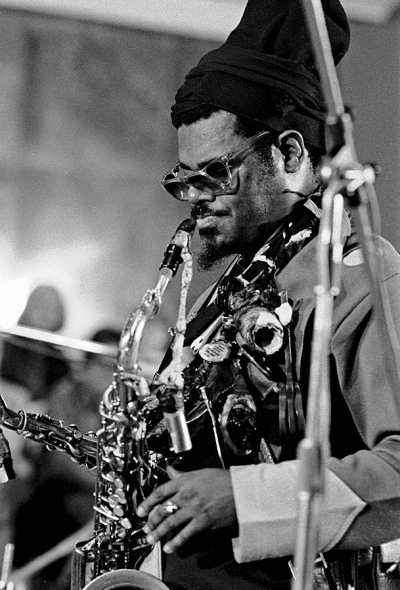.
.
The correct answer is Rahsaan Roland Kirk!
.
Heinrich Klaffs, CC BY-SA 2.0, via Wikimedia Commons

Rahsaan Roland Kirk, 1972
.
.
___
.
.
…..In 1969, in the midst of rock music’s ascent and the social protests that effectively changed the way we looked at war, race and feminism, the great jazz musician Rahsaan Roland Kirk emerged as the leader of “The Jazz and People’s Movement,” a movement to, as John Kruth, author of Bright Moments: The Life and Legacy of Rahsaan Roland Kirk describes it, “rescue black classical music from certain oblivion and thrust it into the consciousness of the unwitting public.” Part of their plan was to “disrupt the prime time airwaves for the sake of the music they dearly loved and believe in,” and they were largely successful at it, disrupting the shows of Johnny Carson, Dick Cavett and Merv Griffin. Their tact was to attend these shows as audience members and then disrupt them by blowing whistles, holding signs (some reading “More Jazz Music On TV” and “Honor American Jazz Music”), and wreaking basic havoc on show schedules. This was so successful that Ed Sullivan invited Kirk to appear as a guest on his show so it wouldn’t be victimized by Kirk’s loud protests from the audience.
…..I recently came across a terrific essay devoted to this chapter in Kirk’s life. In “Rahsaan Roland Kirk’s TV Dreams,” John G. Rodwan, Jr., writes about Kirk’s ambition for saving jazz music by advocating for Black jazz musicians on the popular television of the 1970’s. You can read it by clicking here.
…..Meanwhile…Here is The Jazz and People’s Movement “Statement of Purpose,” drafted in 1969 by Kirk, friend Mark Davis, fellow musician Archie Shepp, and other members of the Movement:
…..Many approaches have been used through the ages in the attempted subjugation of the masses of people. One of the very essential facets of the attempted subjugation of the black man in America has been an effort to stifle, obstruct and ultimately destroy black creative genius; and thus, rob the black man of a vital source of pride and liberating strength. In the musical world, for many years a pattern of suppression has been thoroughly inculcated into most Americans. Today many are seemingly unaware that their actions serve in this suppression. Others are of course more intentionally guilty. In any event most Americans for generations have had their eyes, ears and minds closed to what the black artist has to say.
…..Obviously only utilization of the mass media has enabled white society to establish the present state of bigotry and whitewash. The media have been so thoroughly effective in obstructing the exposure of true black genius that many black people are not even remotely familiar with or interested in the creative giants within black society.
…..Such injustice has reaped immense ramifications for white society. By suppressing black creativity the white man has managed to avoid competitive confrontation – thus insuring his own position and security, both emotionally and monetarily. Concomitantly, he has partially succeeded once more in emasculating a facet of black culture and the black quest for freedom. However, in one respect the pattern of suppression has clearly failed, for though there has been success in blocking the exposure of black artists, and in whitewashing the minds of most Americans, attempts to destroy the sources of creation have not succeeded.
…..Action to end this injustice should have begun long ago. For years only imitators and those who would sell their souls have been able to attain and sustain prominence on the mass media. Partially through the utilization of an outlandish myth, that in artistic and entertainment fields bigotry no longer exists and by show-rooming those few blacks who have sold out, the media have so far escaped the types of response that such suppression and injustice should and now will evoke.
…..Help in the struggle to open the media and to enable black artists to reach the positions of prominence that their artistry so deserves – to breathe new life into black culture.
.
.
Click here to visit Rahsaan Roland Kirk’s Wikipedia page
.
.
___
.
.
.
Watch Rahsaan Roland Kirk play “The Inflated Tear” and “Haitian Fight Song” during a 1971 Ed Sullivan performance, featuring Charles Mingus (bass); Archie Shepp (saxophone); and Roy Haynes (drums). [The Ed Sullivan Show]
.
.
Listen to the 1972 recording of Rahsaan Roland Kirk performing “Blacknuss” [Rhino/Atlantic]
.
.
___
.
.
Click here to play another Jazz History Quiz!
Click here to read The Sunday Poem
Click here for information about how to submit your poetry or short fiction
Click here to subscribe to the (free) Jerry Jazz Musician quarterly newsletter
Click here to help support the ongoing publication of Jerry Jazz Musician, and to keep it commercial-free (thank you!)
.
.
___
.
.
Jerry Jazz Musician…human produced (and AI-free) since 1999
.
.
.





























